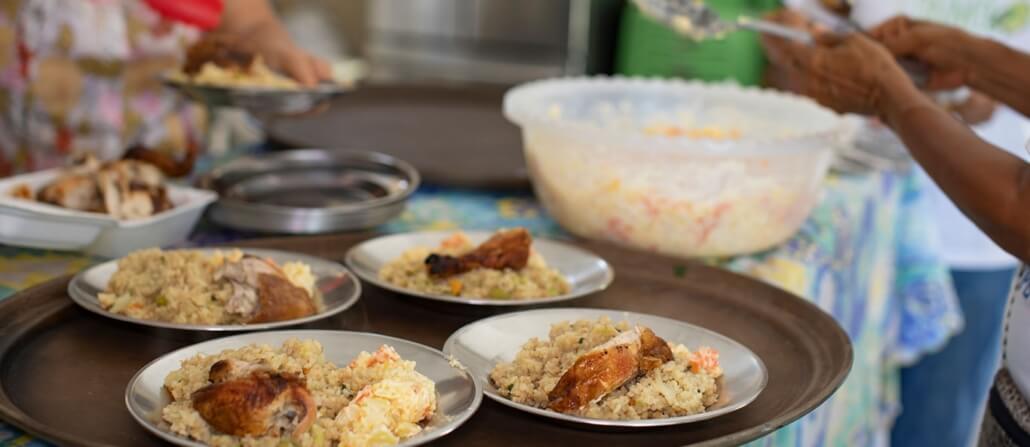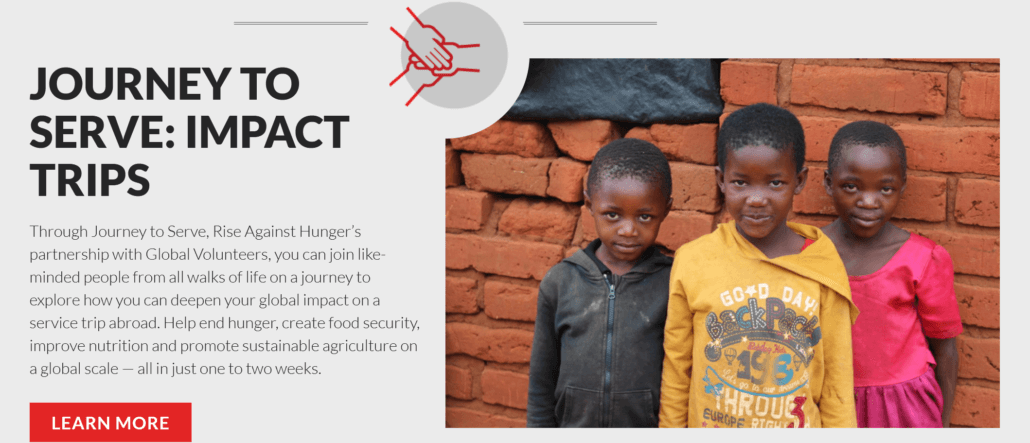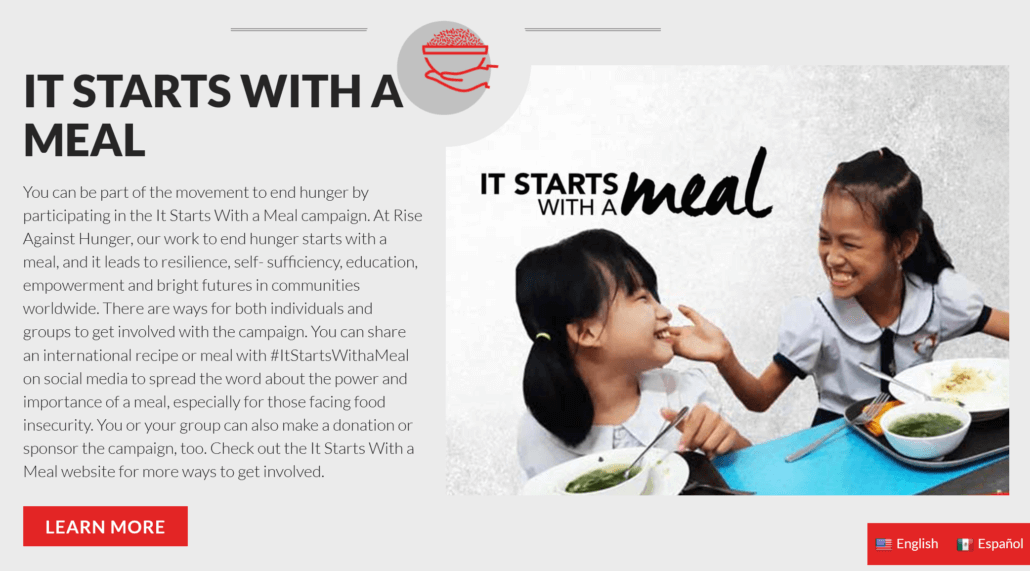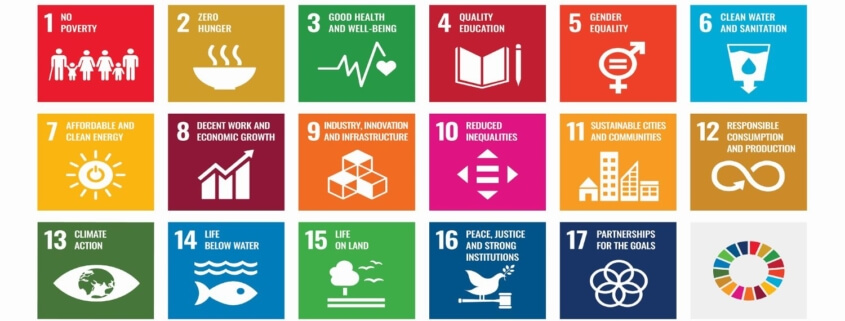Rise Against Hunger and the Sustainable Development Goals
We continue our series on how companion NGOs address the United Nations Sustainable Development Goals (SDGs) with an interview with our partner, Rise Against Hunger’s Chief Executive Officer Barry Mattson and Chief Programs Officer Edna Ogwangi. Global Volunteers’ multi-faceted partnership with Rise Against Hunger is a model for international cooperation to multiply NGO impact. A significant contribution is Rise Against Hunger’s donation of fortified meals to Global Volunteers’ Reaching Children’s Potential (RCP) Program in Tanzania. Through Journey to Serve, Rise Against Hunger encourages like-minded people associated with their multiple programs to participate on Global Volunteers service program abroad to “help end hunger, create food security, improve nutrition and promote sustainable agriculture on a global scale.” Read on to learn about the breath of Rise Against Hunger’s commitment to the SDG’s agenda.
Sustainable Development Goal #2 seeks sustainable solutions to end hunger in all its forms by 2030 and to achieve food security. The aim is to ensure that everyone everywhere has enough good-quality food to lead a healthy life. However, current estimates are that 8.9 percent of the world population – up by 10 million people in one year and by nearly 60 million in five years – are hungry. The COVID-19 pandemic could now put an additional 130 million people at risk of suffering acute hunger.
From its early roots in 1998, RAH has facilitated volunteer packaging of more than 540 million meals to be distributed to hungry people in countries around the world. Mobilizing a global network of “hunger champions,” RAH meal packaging events produce millions of nutritious meals annually that are then distributed to partners who are best able to address the causes and effects of hunger based on their local presence and expertise. Through their thorough monitoring and evaluation process, they ensure the meals are used as tools to change lives by promoting education, improving students’ health and nutrition, addressing gender inequalities, stimulating economic growth and fighting child labor.
Edna: As an organization driven by the vision of a world without hunger, Rise Against Hunger directly supports UN Sustainable Development Goal #2 of Zero Hunger. All the SDGs are interconnected as well, meaning that reaching zero hunger is essential not only for achieving Goal #2, but also for reaching all 17 goals. Proper nutrition can improve maternal health, support a child’s academic performance, promote poverty reduction and play a role in responsible consumption and production.
How Rise Against Hunger addresses hunger in countries around the world really underscores the inter-connectivity of the SDGs, too. Our work not only supports immediate short-term solutions, but also contributes to long-term solutions that alleviate poverty and support education, health,and nutrition outcomes that build resilient and thriving communities. We call this our four Pathways to End Hunger — Nourishing Lives, Empowering Communities, Responding to Emergencies and Growing the Movement.

Nourishing Lives supports nutrition-based safety net programs, particularly in school settings. Rise Against Hunger meals are distributed to help communities meet their immediate, basic needs. In addition, we also work to establish long-term food security through our Empowering Communities Pathway. This Pathway’s sustainable agriculture projects and income-generating activities enable individuals and communities to increase their production and access to food, boosting resilience and self-sufficiency. We also support communities facing crises through our Responding to Emergencies Pathway. Political conflicts, natural disasters and other emergencies can disrupt food systems and increase food insecurity, so we work with our in-country partners to respond and address food insecurity and nutritional needs in affected communities. Finally, our Growing the Movement Pathway focuses on the engagement of volunteers and advocates and, in turn, their support to build awareness and drive action to end hunger.
How important/useful are the SDGs as a motivational or organizational tool for international cooperation on the global hunger crisis?
Barry: The SDGs are certainly an important tool for cooperation and to align individuals, organizations and governments internationally on the work to be done to address the global hunger crisis. Our fourth Pathway to End Hunger, Growing the Movement, was established because we know that progress toward ending hunger requires the engagement of as many people as possible coming together to work toward this common goal. The SDGs provide credibility to that common goal and underline its significance. Supporting Sustainable Development Goal #2 motivates our work and serves as a reminder of the importance of our mission, as I’m sure it does for many others as well.

How do you describe your SDG outcomes annually? Do you have a formal process for measuring this?
Edna: Each year, we publish a report that details the impact we (and our Global Confederation members in Malaysia, the Philippines, South Africa, Italy and India) were able to have in the global communities we serve. Through this reflection, we are able to assess how lives were reached through each Pathway and what we can do to continue and expand our impact. Our 2020 impact results were recently released, which we shared with our donors, volunteers and audience. More than 2.8 million lives were impacted and 47.4 million meals were consumed across 41 countries last year.
How has the pandemic curtailed your ability to work toward Zero Hunger, and what will be needed post-pandemic for you to address increased need?
Barry: The pandemic affected several elements of our work to end hunger. One of the biggest challenges we faced was shifting how we serve. We saw a decline in meal packaging events and, therefore, had a decreased inventory of meals to distribute to the communities reached through our Pathways. Our commitment will always be to the people we serve, so that decline required us to shift quickly and develop new ways to deliver impact. In addition to continuing the distribution of our inventory of Rise Against Hunger meals and the implementation of our Empowering Communities projects, we also piloted local and regional food procurement with some of our in-country partners to diversify our food assistance options. It became a key component to supporting communities and families around the world, with 16% of the meals we distributed being locally procured food.
Beyond affecting how we work, it’s also important to highlight how COVID-19 influenced our work due to what we were hearing and seeing about the pandemic’s effects on food insecurity. The number of people facing food insecurity has increased drastically, with the Food and Agriculture Organization predicting that between 83 and 132 million more people will be undernourished. This has made our work more vital than ever. The pandemic has increased the need globally, and Rise Against Hunger is working to meet the need. Right now and as pandemic restrictions continue to ease, we need people to support our efforts — whether that’s by hosting a meal packaging event, donating, participating in one of our virtual opportunities or spreading the word. Getting involved and growing the movement to end hunger will help Rise Against Hunger continue to impact lives in countries across the globe.

“It Starts With A Meal” campaign offers pathway to join Zero Hunger effort
The organization’s latest campaign drives discussion and awareness about the critical realities of food insecurity around the world, and provide opportunities to take action today to help end hunger tomorrow. “We forecast 2021 to be another challenging year for those facing hunger due to the pandemic’s effects around the world,” Barry says. “Taking action to help end hunger has never been more important, and It Starts With A Meal gives new ways to do so. He added they hope to serve over 5,300 people in 2021 through the campaign’s proceeds.
The campaign includes a social call-to-action for individuals to share a global recipe online and discuss the power of a meal with the hashtag #itstartswithameal. Additionally, It Starts With a Meal is launching with an Instagram campaign featuring food and lifestyle bloggers sharing their globally inspired recipes and encouraging their audiences to take action in support of the global hunger crisis. Corporate partners are lending promotional and financial assistance while consumer fundraising opportunities and a digital hub of critical information about the global hunger crisis urges the public to join the movement to help end hunger.
Global Volunteers respects and supports Rise Against Hunger’s work to bring the benefit of the SDGs to struggling communities around the world. We share their vision to defend all persons without compromising the potential of future generations to meet their needs, and invite opportunities for NGO partnerships in these areas. Read on to learn how Global Volunteers’ impacts address the United Nations SDGs and how our Reaching Children’s Potential Program is helping to end stunting in Tanzanian villages.“




Leave a Reply
Want to join the discussion?Feel free to contribute!